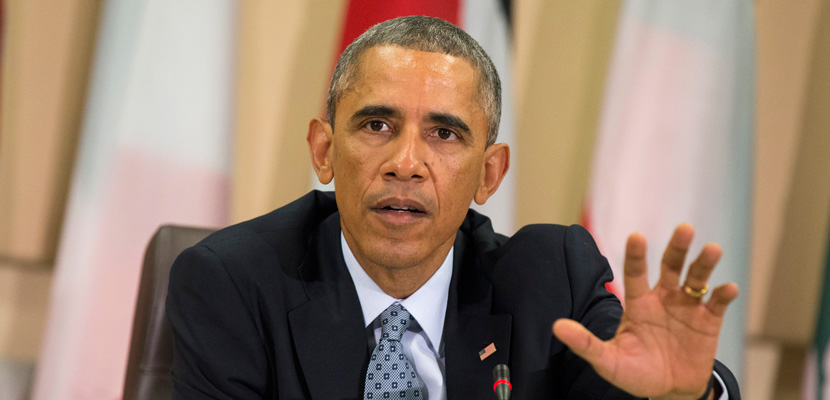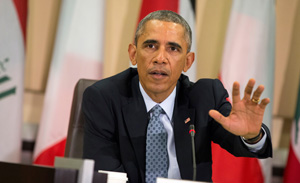When Israeli Prime Minister Benjamin Netanyahu spoke at the United Nations on September 29, he had a number of concerns on his mind, but one stood out above the rest. He feared that President Obama was downgrading the struggle against the Iranian nuclear program. “To defeat [the Islamic State] and leave Iran as a threshold nuclear power,” Netanyahu said in the most quotable line of his speech, “is to win the battle and lose the war.”
Netanyahu had good reason to sound the alarm. An examination of Obama’s recent moves in the Middle East reveals that he has exploited the U.S.-led military campaign against the Islamic State (IS) in order to increase cooperation with Iran in matters of regional security. Of course, administration officials dismiss any suggestion that they are “coordinating” with the Iranians militarily. In their next breath, however, they grudgingly concede otherwise—acknowledging, for example, that we provided advance notice to Tehran of the anti-IS coalition’s bombing plans in Syria. They also acknowledge opening “a quiet backchannel” to Tehran in order to “de-conflict” Iranian and American operations in Iraq.
Indeed, “de-conflict” is the favored euphemism of the moment. “No, we’re not going to coordinate,” Secretary of State Kerry said in reference to Iran’s client Bashar Assad and the military campaign against IS. “We will certainly want to de-conflict, . . . but we’re not going to coordinate.”
Too clever by half, this distinction is hardly lost on America’s traditional allies in the region, all of whom regard the Iranian alliance system, which includes Syria and Hizballah, as their primary enemy. Middle East media are replete with stories of backroom deals between Washington and Tehran. Given the enormous gap between what the Americans are claiming in public about Iran and what they are seen to be doing in private, even the false reports carry an air of plausibility.
No less a personage than Ali Khamenei, Iran’s supreme leader, recently joked about the hypocrisy. Emerging from a hospital stay for surgery, he said he’d amused himself during his convalescence by keeping track of the lies of American officials who, while disclaiming any appeals for Iranian assistance, were privately begging for help. Even John Kerry, he delighted in adding, had approached the Iranian foreign minister with cap in hand—the very same Kerry who had piously announced “in front of the whole world, ‘We will not request help from Iran.’”
According to Khamenei, Iran has rejected all of the American requests. But Tehran has indeed permitted operational coordination—sorry, “de-confliction”—with the United States. In effect, Khamenei has set Iran up as America’s silent partner in the Middle East, and Kerry himself, at a recent hearing of the Senate Foreign Relations committee, testified to the value the administration places on this partnership. Grilled by Senator Marco Rubio about glaring deficiencies in the American strategy against IS, Kerry offered a stunning defense. “[Y]ou’re presuming that Iran and Syria don’t have any capacity to take on [IS],” he lectured Rubio. “If we are failing and failing miserably, who knows what choice they might make.”
Iran, in the administration’s view, should thus be seen as a force multiplier for the United States. This line of reasoning has a long history, as one can detect by reading between the lines of Leon Panetta’s new memoir, Worthy Fights. Panetta, who served Obama both as secretary of defense and director of the CIA, recounts how he and his colleagues on the National Security Council (NSC) fought with the president over the American endgame in Iraq. Urged by the NSC to reach an agreement with Iraqi Prime Minister Nouri al-Maliki for American troops to remain in the country, the president refused. Why? Obama, Panetta explained in a recent interview, nursed “the hope that perhaps others in the world could step up to the plate and take on” the role of stabilizing Iraq.
Which others? Panetta did not specify, but Obama undoubtedly assumed that Iran, the obvious candidate, would see Iraqi stability as in its own self-interest. It was a severe miscalculation. The precipitous departure of the American forces, Panetta argues in his book, removed the United States as a bulwark against Shiite sectarianism and led ineluctably to the alienation of Iraq’s Sunnis—developments that (as Panetta omits to point out) took place under the sheltering umbrella of Iranian power.
Later, when civil war broke out in Syria, Obama’s policy was similarly deferential to Tehran, and with similar consequences. In 2012, he rejected another unanimous recommendation of the NSC: this time, to aid the Syrian rebels. It was the same advice he’d received from America’s allies in the Middle East, who grew ever more insistent as it became clear that Iranian intervention was giving Bashar Assad the upper hand. But Obama held his ground and, in doing so, effectively recognized Syria as an Iranian sphere of interest and hence inviolate.
Of course, Obama has never described his calculus in such terms. But he has hinted at it—by, for example, expressing his opposition to American participation in a Sunni-Shiite “proxy war,” which is nothing if not a synonym for a war against Iran.
Impolitic recent statements by Vice President Joseph Biden testify further to the astounding bias in the Obama administration against America’s traditional friends in the Middle East. Discussing the Syrian civil war, Biden developed at length the theme that “our biggest problem is our allies”—even as, on the ground in Syria, coalition military operations against IS are indirectly strengthening those allies’ enemies, starting with Assad. In the words of an American official quoted in the New York Times, “It would be silly for [Assad’s forces] not to take advantage of the U.S. doing airstrikes. . . . Essentially, we’ve allowed them to perform an economy of force. They don’t have to be focused all over the country, just on those who threaten their population centers.”
In the past, to assuage America’s allies who were angry at the pro-Iranian bias in U.S. policy, Obama pledged to build up the anti-Assad rebels in the Free Syrian Army (FSA). But he never really followed through on his pledge. Now he is playing the same tattered card in order to enhance the coalition against IS. But General John Allen, the commander of the coalition, has made the insincerity transparent by stating that training and equipping the FSA “could take years”—in other words, until after Obama has left office.
What would it take for Obama to change course? Here, Turkey has assumed the lead. If the American leader wants Turkey as a full-fledged ally, President Recep Tayyip Erdogan has insisted, then he must agree to oust Syria’s Assad. This demand places Obama in a difficult bind. If he fails to gain Turkey as a true partner, the coalition against IS will be hollow at its core. But he has explicitly dedicated himself to avoiding the kind of large-scale war that Turkey requires of him.
More to the point, meeting Turkey’s demand would also entail scuttling the administration’s silent partnership with Iran in Syria—a move that Tehran, for its part, would not take sitting down and might counter by, for instance, bringing Israel under attack. Indeed, as Iran’s deputy foreign minister recently revealed, Tehran has directly warned that efforts by the U.S. or its allies to topple Bashar Assad would place Israel at risk. Hizballah’s October 7 attack on Israeli forces, its first declared such operation since 2006, proves the seriousness of the threat.
And Iran has other means of retaliation as well, for instance by adopting an even more recalcitrant position in the current negotiations over its nuclear program. By all accounts, those negotiations are failing. With no agreement expected before November 24, the expiration date of last year’s interim deal, Khamenei can contemplate several possible courses of action. He might, for example, extend the interim deal in return for a reward in the form of further relief from sanctions. That would at least allow Obama to buy time. But what if Khamenei were instead to demand an even more exorbitant reward, or threaten to abandon negotiations altogether?
Either of those choices would deeply complicate Obama’s life, precisely at the moment when the war against IS grows ever more burdensome. Whatever Khamenei chooses, it is he, not Obama, who now holds the initiative.
In brief, our silent partnership with Tehran has simultaneously emboldened Tehran and other enemies and alienated our allies: the very same allies who are vital to subduing IS. In the meantime, that silent partnership not only has done nothing for us, it has considerably weakened our hand—and that of its main proponent, Barack Obama. Yet he shows no sign of considering alternative strategies. No wonder Netanyahu sounded the alarm in New York.
More about: Barack Obama, Benjamin Netanyahu, Foreign Policy, Iran, Islamic State, Nuclear Bomb








